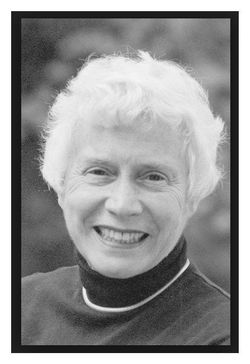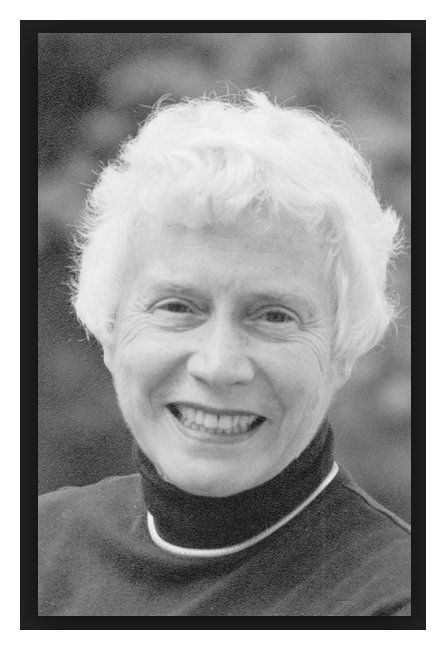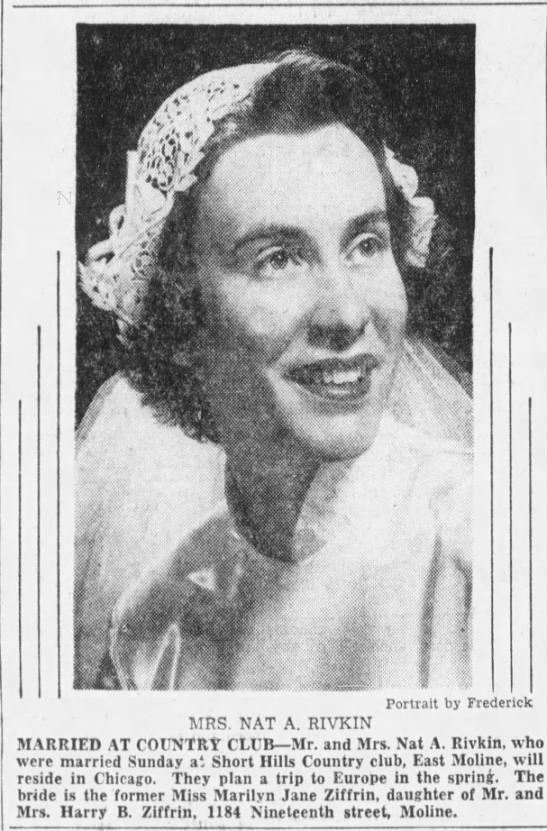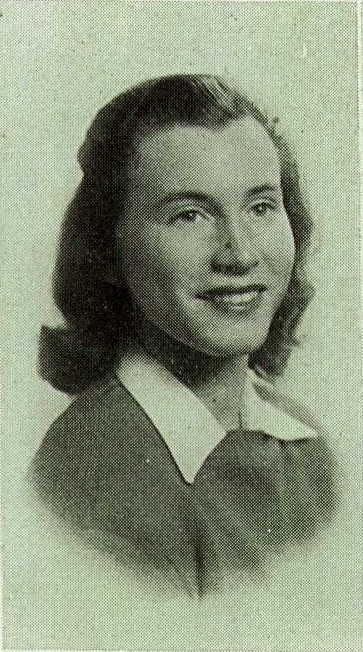Age; 91 yrs.
D/O Harry B. Ziffrin & Betty S. Ziffrin
W/O Nathaniel Abraham Rivkin (7 Mar 1926-14 Jun 1992); m 3 Feb 1952, East Moline, Rock Island County, Illinois, USA; div
Obituary, Chadwick Funeral Service (New London, NH), 16 Apr 2018:
Obituary--Marilyn J. Ziffrin (August 8, 1926 - March 16, 2018)
Composer, Educator, Author, Musician
Marilyn J. Ziffrin devoted her entire life to creating music. The adjectives used to describe the composer range from brilliant and fun to intense. They could also be used to describe her music.
Marilyn Jane Ziffrin was born on 7 August 1926 in Moline, Illinois to Betty S. and Harry B. Ziffrin. Her parents were both children of Russian immigrants who left Belarus amidst growing anti-semitism in the late nineteenth century. The Ziffrin household was always filled with music, as every member played at least one instrument. Three years of piano lessons were mandatory for Marilyn and her two brothers, Norman and James; and so Marilyn began studying piano at age four. It was during her first piano lesson, at the age of four when she knew that she wanted to be a musician.
In addition to the piano, Ziffrin also studied clarinet and saxophone. She organized a band in junior high school and also began composing. She attended the Moline Public Schools graduating as valedictorian of her high school class and continued on to University of Wisconsin, Madison. Ziffrin took a double major in applied music and instrumental music education, graduating cum laude with a Bachelor of Music degree in 1948. She earned her Master's Degree in music from Columbia University in 1949, where she wrote her first large scale work, a piano concerto, which won critical acclaim from the faculty. Music history professor Howard Murphy took a special interest in Ziffrin and encouraged her to continue composing. At his suggestion, she joined the National Association of Composers and Conductors.
Soon after graduating from Columbia University, she found her aspirations to work as a conductor at a college or university thwarted. The placement agency representative informed her that as long as he was alive, she or any other woman would never be placed as a conductor. Several years later, she auditioned one of her compositions for an elderly male music director in New York, who commented, "What strong music from such a little girl." Regardless, Ziffrin persisted in pursuing her goals.
From 1952-55 she studied privately with her principle composition teacher, Alexander Tcherepnin, who encouraged her to go to the MacDowell Colony and realize her potential. Not until the summer of 1961, when as a first time fellow at the MacDowell Colony (of her six total fellowships), did Ziffrin finally feel that she had come into her own as a composer. "It was the first time people looked at me as a composer, so I began to identify myself as a composer."
Her Piano Suite was awarded Second Prize in the composition contest of the Chicago chapter of the ISCM in 1955. Later recorded by Max Lifchitz for North/South Recordings, the reviewer for High Performance Review wrote: "This music has a peculiarly American sound: lean, direct, tonal and often jazzy; it is delightful and unpretentious."
In 1961 Ziffrin also began teaching music at Northeastern Illinois University in Chicago and remained there until 1967 when she accepted a position at New England College in Henniker, New Hampshire. Before taking up her post at New England College, she spent a year in Vermont researching and interviewing Carl Ruggles, the distinguished American composer and painter who was then a Vermont resident. Her biography, Carl Ruggles: Composer, Painter and Storyteller published by the University of Illinois Press in 1994 is considered the definitive biography on Ruggles.
Ziffrin served as Associate Professor of Music at New England College in Henniker, New Hampshire from 1967-1982, and she also taught private composition lessons at St. Paul's School in Concord, New Hampshire from 1972-1983. One of Ziffrin's most renowned composition students was Augusta Read Thomas, who studied with Ziffrin at St. Paul's School from 1979 to 1982.
In addition to teaching, Ziffrin also had a patron/benefactor for fifteen years starting in the 1970s. This provided her the opportunity to concentrate solely on composing for one month with all expenses paid at the patron's ranch in California, which Ziffrin nicknamed 'MacDowell West."
Ziffrin received numerous grants and commissions and was a guest composer at several colleges and universities. She was chosen the 1997 Composer of the Year by the New Hampshire Music Teachers Association. For this work, she combined her love of literature with her sense of adventure and exploration, creating a multi-movement piece for classical accordion and baritone. The text is based on the Love Poems of Propercius, translated by her good friend the distinguished poet Constance Carrier. Though she had never written anything for the accordion, she was undaunted by the project.
Ziffrin wrote numerous compositions, which span several genres including chamber music, orchestra, concert band, solo instrumental, opera and choral works. Most works were commissioned or written for specific performers. The influences of Bartok, Stravinsky, Bach, the synagogue, jazz, and Broadway are all present in Ziffrin's music. They are assimilated to form quite different and distinctive sounds depending on the composition. According to Ziffrin, "While my style continues to change, it is probably best described as eclectic. I choose to believe it is essentially expressive, optimistic, and adventurous."
A similar Gershwinesque flavor is found in the Clarinet Concerto on “Wild-Wood” recorded by Richard Stoltzman and the Warsaw National Philharmonic on MMC recordings.
Ziffrin is included in the major sources devoted to women in music, including the New Grove Dictionary of Music and Musicians. She received many grants, prizes and commissions. All through her music there is evidence of love of melody, a strong structural logic, a keen sense of rhythm and a joyous feeling of affirmation. She was awarded first prize from Delius Composition Competition, 1972, for the song cycle Haiku. SONO, for cello and piano, written for the Wells Duo was a semi-finalist in the 1983 Kennedy Center Friedheim Awards. Her Themes and Variations "In Memoriam" for organ, dedicated to the memory of those artists who have died of AIDS, was commissioned by the Boston chapter of the AGO for the 1990 national meeting. Critic Scott Cantrell writing in The American Organist summed up the work in these words: "Avoiding the Scylla of sentimentality as surely as the Charybdis of hectoring, it impressed as a noble thoughtful statement, effectively conceived for the organ." In 2007, Ziffrin was recognized by the NH Governors Arts Awards with the Lotte Jacobi Living Treasure Award.
Ziffrin's Symphony for Voice and Orchestra, "Letters", written for soprano Neva Pilgrim premiered by the New Hampshire Music Festival, Tom Nee, director, in August 1990. It was recorded by Master Musicians Collective with the Radio Orchestra of Slovakia, Robert Black, conductor, and Neva Pilgrim, soprano. Pilgrim also recorded Ziffrin's Three Songs of the Trobairitz for North/South Recordings in 1994; and then recorded again in 2005 on “Songs & Arias” by Marilyn J Ziffrin with D’Anna Fortunato, mezzo-soprano, for North/South Recordings.
Marilyn Ziffrin lived in New Hampshire for most of her life, enjoyed performing occasionally with friends and continued to devote herself to composing for her entire life. The most recent premier of her work was of “Strings” in NYC on June 7, 2016, which she attended. The premier was in honor of Ziffrin’s 90th birthday and was performed by the North/South Chamber Orchestra, under the direction of Max Lifchitz. After seventy plus years of receiving critical acclaim as a composer, Ziffrin always found it difficult to stand up and take a bow after a performance of her music. Modesty, along with the mere privacy of her nature, prevented her from actively promoting herself. Instead, she insisted that her music should speak for itself.
There have been numerous grants, prizes, and commissions awarded to Ziffrin, including:
Fellow of MacDowell Colony, 1961, 1963, 1971, 1977 (Norlin Foundation fellow), 1980 and 1989; grant from Leopold Schepp Foundation, 1963; first prize from Delius Composition Competition, 1972, for the song cycle Haiku; grants from American Council of Learned Societies, 1974, and Meet the Composer, 1977; grants from American Society of Composers, Authors, and Publishers, 1981-2007, and New Hampshire Commission on the Arts, 1983; resident at Virginia Center for the Creative Arts, 1987; The Music Fix Prize, 1996; NH MTA Composer of the Year, 1997; Honorable Mention, MTNA Shepherd Competition, 1998; Sigma Alpha Iota, Member Laureate; Moline IL High School Hall of Honors, 2002; 2007 New Hampshire Governor’s Arts Award--Lotte Jacobi Living Treasure Award
Ziffrin is survived by four loving nieces, Margery Ziffrin Marlowe, Judith Walker, Linda Ziffrin and Laurie Ziffrin; along with four adoring great nephews, Aaron and Grant Walker, and Norman BZ Abbott and Charlie Abbott; and very wonderful, dear friends. Donations may be made in memory of Marilyn J. Ziffrin to The MacDowell Colony to 521 W. 23rd Street, 2nd Floor, New York, NY 10011
From an interview with Bruce Duffie in 1994 Marilyn Ziffrin said: “I really do think every human being, whether they choose to admit it or not, has an inner life, and it seems to me that music, serious music, deals with the human inner life, not the outer life. It won’t make you richer by any means but it will make you bigger.”
With acknowledgement to Malinda Britton Schantz, Sonneck Society for Music, Spring 1998.
Age; 91 yrs.
D/O Harry B. Ziffrin & Betty S. Ziffrin
W/O Nathaniel Abraham Rivkin (7 Mar 1926-14 Jun 1992); m 3 Feb 1952, East Moline, Rock Island County, Illinois, USA; div
Obituary, Chadwick Funeral Service (New London, NH), 16 Apr 2018:
Obituary--Marilyn J. Ziffrin (August 8, 1926 - March 16, 2018)
Composer, Educator, Author, Musician
Marilyn J. Ziffrin devoted her entire life to creating music. The adjectives used to describe the composer range from brilliant and fun to intense. They could also be used to describe her music.
Marilyn Jane Ziffrin was born on 7 August 1926 in Moline, Illinois to Betty S. and Harry B. Ziffrin. Her parents were both children of Russian immigrants who left Belarus amidst growing anti-semitism in the late nineteenth century. The Ziffrin household was always filled with music, as every member played at least one instrument. Three years of piano lessons were mandatory for Marilyn and her two brothers, Norman and James; and so Marilyn began studying piano at age four. It was during her first piano lesson, at the age of four when she knew that she wanted to be a musician.
In addition to the piano, Ziffrin also studied clarinet and saxophone. She organized a band in junior high school and also began composing. She attended the Moline Public Schools graduating as valedictorian of her high school class and continued on to University of Wisconsin, Madison. Ziffrin took a double major in applied music and instrumental music education, graduating cum laude with a Bachelor of Music degree in 1948. She earned her Master's Degree in music from Columbia University in 1949, where she wrote her first large scale work, a piano concerto, which won critical acclaim from the faculty. Music history professor Howard Murphy took a special interest in Ziffrin and encouraged her to continue composing. At his suggestion, she joined the National Association of Composers and Conductors.
Soon after graduating from Columbia University, she found her aspirations to work as a conductor at a college or university thwarted. The placement agency representative informed her that as long as he was alive, she or any other woman would never be placed as a conductor. Several years later, she auditioned one of her compositions for an elderly male music director in New York, who commented, "What strong music from such a little girl." Regardless, Ziffrin persisted in pursuing her goals.
From 1952-55 she studied privately with her principle composition teacher, Alexander Tcherepnin, who encouraged her to go to the MacDowell Colony and realize her potential. Not until the summer of 1961, when as a first time fellow at the MacDowell Colony (of her six total fellowships), did Ziffrin finally feel that she had come into her own as a composer. "It was the first time people looked at me as a composer, so I began to identify myself as a composer."
Her Piano Suite was awarded Second Prize in the composition contest of the Chicago chapter of the ISCM in 1955. Later recorded by Max Lifchitz for North/South Recordings, the reviewer for High Performance Review wrote: "This music has a peculiarly American sound: lean, direct, tonal and often jazzy; it is delightful and unpretentious."
In 1961 Ziffrin also began teaching music at Northeastern Illinois University in Chicago and remained there until 1967 when she accepted a position at New England College in Henniker, New Hampshire. Before taking up her post at New England College, she spent a year in Vermont researching and interviewing Carl Ruggles, the distinguished American composer and painter who was then a Vermont resident. Her biography, Carl Ruggles: Composer, Painter and Storyteller published by the University of Illinois Press in 1994 is considered the definitive biography on Ruggles.
Ziffrin served as Associate Professor of Music at New England College in Henniker, New Hampshire from 1967-1982, and she also taught private composition lessons at St. Paul's School in Concord, New Hampshire from 1972-1983. One of Ziffrin's most renowned composition students was Augusta Read Thomas, who studied with Ziffrin at St. Paul's School from 1979 to 1982.
In addition to teaching, Ziffrin also had a patron/benefactor for fifteen years starting in the 1970s. This provided her the opportunity to concentrate solely on composing for one month with all expenses paid at the patron's ranch in California, which Ziffrin nicknamed 'MacDowell West."
Ziffrin received numerous grants and commissions and was a guest composer at several colleges and universities. She was chosen the 1997 Composer of the Year by the New Hampshire Music Teachers Association. For this work, she combined her love of literature with her sense of adventure and exploration, creating a multi-movement piece for classical accordion and baritone. The text is based on the Love Poems of Propercius, translated by her good friend the distinguished poet Constance Carrier. Though she had never written anything for the accordion, she was undaunted by the project.
Ziffrin wrote numerous compositions, which span several genres including chamber music, orchestra, concert band, solo instrumental, opera and choral works. Most works were commissioned or written for specific performers. The influences of Bartok, Stravinsky, Bach, the synagogue, jazz, and Broadway are all present in Ziffrin's music. They are assimilated to form quite different and distinctive sounds depending on the composition. According to Ziffrin, "While my style continues to change, it is probably best described as eclectic. I choose to believe it is essentially expressive, optimistic, and adventurous."
A similar Gershwinesque flavor is found in the Clarinet Concerto on “Wild-Wood” recorded by Richard Stoltzman and the Warsaw National Philharmonic on MMC recordings.
Ziffrin is included in the major sources devoted to women in music, including the New Grove Dictionary of Music and Musicians. She received many grants, prizes and commissions. All through her music there is evidence of love of melody, a strong structural logic, a keen sense of rhythm and a joyous feeling of affirmation. She was awarded first prize from Delius Composition Competition, 1972, for the song cycle Haiku. SONO, for cello and piano, written for the Wells Duo was a semi-finalist in the 1983 Kennedy Center Friedheim Awards. Her Themes and Variations "In Memoriam" for organ, dedicated to the memory of those artists who have died of AIDS, was commissioned by the Boston chapter of the AGO for the 1990 national meeting. Critic Scott Cantrell writing in The American Organist summed up the work in these words: "Avoiding the Scylla of sentimentality as surely as the Charybdis of hectoring, it impressed as a noble thoughtful statement, effectively conceived for the organ." In 2007, Ziffrin was recognized by the NH Governors Arts Awards with the Lotte Jacobi Living Treasure Award.
Ziffrin's Symphony for Voice and Orchestra, "Letters", written for soprano Neva Pilgrim premiered by the New Hampshire Music Festival, Tom Nee, director, in August 1990. It was recorded by Master Musicians Collective with the Radio Orchestra of Slovakia, Robert Black, conductor, and Neva Pilgrim, soprano. Pilgrim also recorded Ziffrin's Three Songs of the Trobairitz for North/South Recordings in 1994; and then recorded again in 2005 on “Songs & Arias” by Marilyn J Ziffrin with D’Anna Fortunato, mezzo-soprano, for North/South Recordings.
Marilyn Ziffrin lived in New Hampshire for most of her life, enjoyed performing occasionally with friends and continued to devote herself to composing for her entire life. The most recent premier of her work was of “Strings” in NYC on June 7, 2016, which she attended. The premier was in honor of Ziffrin’s 90th birthday and was performed by the North/South Chamber Orchestra, under the direction of Max Lifchitz. After seventy plus years of receiving critical acclaim as a composer, Ziffrin always found it difficult to stand up and take a bow after a performance of her music. Modesty, along with the mere privacy of her nature, prevented her from actively promoting herself. Instead, she insisted that her music should speak for itself.
There have been numerous grants, prizes, and commissions awarded to Ziffrin, including:
Fellow of MacDowell Colony, 1961, 1963, 1971, 1977 (Norlin Foundation fellow), 1980 and 1989; grant from Leopold Schepp Foundation, 1963; first prize from Delius Composition Competition, 1972, for the song cycle Haiku; grants from American Council of Learned Societies, 1974, and Meet the Composer, 1977; grants from American Society of Composers, Authors, and Publishers, 1981-2007, and New Hampshire Commission on the Arts, 1983; resident at Virginia Center for the Creative Arts, 1987; The Music Fix Prize, 1996; NH MTA Composer of the Year, 1997; Honorable Mention, MTNA Shepherd Competition, 1998; Sigma Alpha Iota, Member Laureate; Moline IL High School Hall of Honors, 2002; 2007 New Hampshire Governor’s Arts Award--Lotte Jacobi Living Treasure Award
Ziffrin is survived by four loving nieces, Margery Ziffrin Marlowe, Judith Walker, Linda Ziffrin and Laurie Ziffrin; along with four adoring great nephews, Aaron and Grant Walker, and Norman BZ Abbott and Charlie Abbott; and very wonderful, dear friends. Donations may be made in memory of Marilyn J. Ziffrin to The MacDowell Colony to 521 W. 23rd Street, 2nd Floor, New York, NY 10011
From an interview with Bruce Duffie in 1994 Marilyn Ziffrin said: “I really do think every human being, whether they choose to admit it or not, has an inner life, and it seems to me that music, serious music, deals with the human inner life, not the outer life. It won’t make you richer by any means but it will make you bigger.”
With acknowledgement to Malinda Britton Schantz, Sonneck Society for Music, Spring 1998.
Family Members
Sponsored by Ancestry
Advertisement
Advertisement







